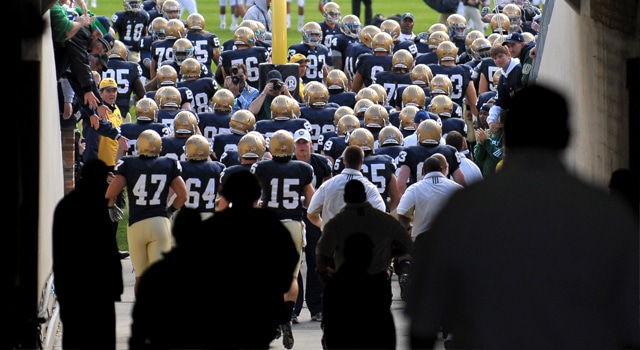

This is article is provided courtesy of Lisa Kelly at No Coast Bias. Be sure to check out the rest of her “Where Are They Now” series which catches up with Irish players from past years.
Pete Bercich, the son of a former NFL player, had one dream as a kid growing up in Joliet, Ill. – to fly fighter planes for the Air Force. A successful high school football career at Providence Catholic High School prompted him to reevaluate his plans. After being recruited by many of the best collegiate football, he decided to play football at Notre Dame before going on to play seven more seasons in the NFL with the Minnesota Vikings. Bercich now lives in Minnesota with his wife Amy and three children, ages 12, 10, and 8. One of his current interests is radio broadcasting and he will be part of the Minnesota Vikings broadcast team this season. Here is a look back with Pete Bercich.
Q: You have said that your first love was baseball. What made you decide to play football at the collegiate level?
A: “Baseball was what I loved to do, but then I realized in high school that mentally it was not what I wanted to do. It did not suit me. Baseball is all about dealing with failure. Effort means a lot, but it does not mean as much in baseball as it does in football. How I dealt with failure (in both baseball and football) was getting pissed off. I didn’t deal with failure well at all. In football, if you work hard, you will probably have success. I also learned that it was much easier to take out my frustrations in football, than it was in baseball.”
“At the end of my sophomore year in high school I realized I could play with the seniors and hold my own. We won state that year, and I felt like I was definitely part of the turning point of that team. During junior year letters started showing up from big schools … Miami, Southern Cal, Michigan, Penn State. My father played in the NFL. He played on the original Dallas Cowboy team, and both my parents went to Michigan State. My Dad never talked about football, though. He maybe had one football picture in the house. I think that took a lot of pressure off me.”
“One thing I will say about high school football, your high school teammates are the friends you will keep all your life. In college, you may keep a friend or two. If you play in the NFL, you may keep one or two there as well. Your high school playing days are your glory days. They stay with you with you forever.”
Q: What made you go to Notre Dame instead of following in your parents footsteps and going to Michigan State?
“When my dad played football at Michigan State, he played with MSU coach George Perles, so when I was looking at MSU I already had some familiarity. Not to mention the fact that we had been to campus for several games, we would go to MSU to watch camp, and my uncle had done some work with the hockey team. I didn’t watch a ton of college football when I was a kid, but the main reason I liked Michigan State so much was a result of my huge dislike for Michigan football. MSU was a consideration for sure. I took an official visit there, but my parents were good about not putting any pressure on me to follow in their footsteps.”
“The number one school on my list was Stanford. Denny Green was one of the coaches at Stanford, and came and made a visit to my parent’s house. We had this gigantic Rottweiler, and the dog would go bananas any time someone would come to the house. We could not lock him up, because he would just claw his way out. So there we sit, trying to talk and have a meeting with this dog going nuts. Yes, we were a little bit country, we had the dog out. You should have seen the look on Denny’s face when this gigantic dog came out.”
“When I visited Stanford, Chris Walsh was my host. Going out to California was quite a trip for me. Half of their weight room was outside. It was a totally different atmosphere for me. But it was just too far away from my folks and they would not have been able to see me play. Being accepted to Stanford was a big accomplishment for me, though.”
“I was also really interested in Air Force because I wanted to fly fighter planes. Saying no to Air Force about broke my heart.”
“I took official visits to Stanford, Michigan State, Illinois, Tennessee and Notre Dame.”
“Stanford was my No. 1. Notre Dame was my No. 2. Barry Alvarez was the offensive coordinator at Notre Dame; he said Notre Dame was a no-brainer for me. ‘You’re a Chicago kid, from a Catholic High School. You’ll get a good education and get to play football,’ he told me.”
“Alvarez told me many things, but this is one of the things that still sticks with me today. I knew that Notre Dame was a top football place, and that lots of great local Chicago kids went there. But at the same time, the amount of playing time that I was going to get (or not get) at ND was a big concern for me. Why would you want to go there you were not going to get the opportunity to play? That was the only real objection that I had to attending Notre Dame. And then Coach Alvarez said, ‘If you are good enough to play Division I football, then you will play in high school. If you are good enough to play football in the NFL, then you will play in college. And by the way, while you are here you will get one hell of a good education.’ That really hit home with me. I knew that Notre Dame was the right place with me. And my objection was definitely proven wrong as nine guys in my class were drafted, five of which were selected in the first round, including Jerome Bettis and Tommy Carter.”
Q: I found a video on YouTube of you flying with the Blue Angels. What was that like?
A: That was probably the most awesome 50 minutes of my entire life. That was the number one thing on my bucket list. When I was a kid I wanted to go to the Air Force Academy and I wanted to be a fighter pilot. I have a friend who is a pilot and we fly up to Canada all the time. Flying with the Blue Angels was incredible. We burned 10,000 pounds of jet fuel, had 7Gs of positive force, came close to a negative three … amazing.”
Q; So many people refer to your senior season as the year ND “should have” won the national title. What was the most frustrating thing about that season?
A: “After we beat Texas A&M in the Cotton Bowl, we thought we’d win the coaches poll and Florida State would win the AP poll, and that we’d be co-national champions. We didn’t think we’d win it outright, but we did feel slighted that we got nothing at all. We had a good idea of what the media felt about us during the week going into the Notre Dame-FSU “Game of the Century.” There was a certain color that everything was looked through. There is no way ND can beat FSU. Why do they think they can beat FSU? That week was a bit of an awakening for a lot of us. The great football minds at large didn’t give us any chance to beat FSU. Just like when we played Florida in the Sugar Bowl in ’92. The big joke was, ‘What’s the difference between Notre Dame and Cheerios? Cheerios belong in the bowl.’ And that team did not let the media stop them from getting the job done either.”
Q: What was your best ND football memory?
A: “I’ll never forget the first day of football training camp. John Witmer was on the training staff, and Jim Russ was the head athletic trainer. The first day you go from station to station and get fitted for your uniform, pads and helmet. John Witmer was putting shoulder pads on me and I asked for a neck roll. He looked me and said, ‘What the (expletive) do you need a neck roll for?’ At that moment I realized that college was totally different than high school. You go through the recruiting process and everyone is kissing your butt, and then Lou (Holtz) gets up and gives a speech after practice about how terrible you all look and you’re sitting there thinking, who is this guy?”
“As a freshman at ND, I remember the first round of tackling drills that we did at that first training camp. I was looking across from me at who I was going up against, and I see: Ricky Watters, Rodney Culver, Lee Becton, Tony Brooks, Reggie Brook, Jerome Bettis, Anthony Johnson, and all I could think was, ‘Oh crap.’ You’re counting down the line to see who you are going to face, hoping that you get the walk on.”
“At that point you realize that this is for real. This is no joke. This is serious business.”
Q: What was your biggest challenge at Notre Dame?
A: “Time management and organization was a big challenge for me. I graduated early, in 3 1/2 years, with a degree in finance. We were required to take nine credit hours in summer school, and then I also took 15 credit hours each spring and fall. There were only about two or three weeks a year where you were actually off. You went from fall camp, to football season, to winter conditioning, to spring practice, to summer school and then you did it all over again. Then you add classes on top of all that, and you really had to make sure that you were managing your time efficiently.”
Q: How do you remember your NFL draft?
A: I was picked 211th overall in the draft, in the seventh round. I went on the second day of the draft, and by the end of the day I wasn’t really even watching. I was just waiting for the phone to ring. After my NFL career, once I started coaching in the NFL, I figured out how the drafting process works. It is not really how well you did in college, but more the projections of how are going to do in the NFL. You don’t understand that when you are going through it. You see guys getting chosen before you and you think, ‘Man, I am better than they are.’ I was at my house watching the draft with my parents and I was outside with a friend when the call came. That day was such a long day. For my fellow teammates Jim Flannigan and Tim Rudy, it was a matter of when they got drafted. For me, it was more of a matter of if I got drafted.”
“The only person who is happy on draft day is the person who gets picked first. Everyone else thinks they should have been selected higher.”
“Being selected by (head coach) Dennis Green and the Minnesota Vikings was perfect for me. He had recruited me back when he was at Stanford, so I had known him since I was 18. It was great because I already had a relationship with him.”
Q: What was highlight of your NFL career? What were the highs and lows of playing in the NFL?
A: “My first NFL mini-camp, I show up, and I remember sitting in the meeting room after the first day of practice. I remember looking over at John Randle, who is sitting up against the wall, and he’s just bouncing up and down. He can’t even sit still. I start thinking to myself, I do not belong here. I remember thinking, if they cut me today, I will be okay. When I came out of college, I hated football. You really didn’t get a chance to enjoy it at Notre Dame; you were just under so much pressure. You were worried about the carpet getting pulled out from under your feet.”
“Tackling Barry Sanders was probably the biggest moment of my NFL career. Most of the time you tackle somebody and don’t even think twice about it. After I tackled Barry Sanders my first thought was, ‘Oh my God, I just tackled Barry Sanders.’
“The 1998 NFC championship game was definitely the worst moment. We lost the NFC championship game to Atlanta after having gone 15-1 that year. That was a tough loss.”
“I definitely became a better football player during my time in the NFL. From a mental aspect, I kept learning. I loved the strategy of the game. The x’s and o’s. The whole thing just fascinates me. As a player I was able to learn multiple positions. I not only played special teams, but I could be a backup at five different spots. They would put me in there and trusted me that I was not going to make any mental mistakes, or blow a coverage. That was my niche in the NFL. New guys would come in who were bigger, stronger and faster. But from a mental stand point, they couldn’t beat me.”
“In the NFL, you are basically holding on for dear life on a daily basis. Notre Dame prepared me for that. You threw yourself into it and did the best you could to hang on. I was ready to work when I got to the NFL because they worked us to death in college. In the NFL, you are treated like an adult .Like a man. You go home to your families after practice. It’s professional. It’s a job. It’s a livelihood.”
Q: Where did life take you after football?
A: “After I was done playing in the NFL I spent a year working for a company called Bremen Castings Bremen Castings, Inc. is a precision CNC machine shop with our own green sand foundry under one roof. BCI knows that Status Quo Sucks, and our partners/customers cannot achieve “World Class” status without companies like BCI.”
“The owner and I became friends during my NFL off seasons while I was working out in South Bend. We met through a mutual friend, and he told me when I was done playing ball that he’d have a job waiting for me. My wife and I bought a house in Granger, Ind., so we could be close to her parents in southwest Michigan, and I took the job at the foundry. At the same time I was trying to get a job as a coach. During my last year with the Vikings Denny Green had pulled me aside and told me that I should think about coaching. My first go at it didn’t work out so well, which is how I ended up at the foundry. In January of 2002, Mike Tice was hired as the head coach, and they asked me to come back and try my hand at coaching again. We sold our house in Indiana and moved to Minnesota so that I could coach full time. I was an assistant coach for the Vikings. I spent one year doing quality control and four years as a linebacker coach. Coaching taught me even more about the game.”
“When Tice was fired they brought in Brad Childress, and I was let go with 10 days left on my contract. I tried to get on somewhere else, but it just didn’t work out. I took a job Merrill Lynch as a financial advisor in 2006, and then on Monday mornings I would go into the local radio station (for free) from 6 am – 7 am and do analysis of Sunday’s game, so that I could get to work for an 8 am meeting. At the end of that season the Vikings radio analyst retired and in 2007 I was offered the job.
Pete Bercich, part of the 2012 Viking Radio Network broadcast team.
This NFL season will be my first as a part of the Viking radio network team (Analyst Minnesota Vikings Radio Network at KFAN AM 1130 Minneapolis). The Vikings are getting more involved in the entertainment aspect of the game. Currently I fill in on the radio during the week. Mark Rosen (Co-host on Mark Rosen’s Sports Sunday at WCCO-TV) and I do his show on Sunday nights, and in the mean time I am back at Bremen Castings as an Account Manager in the upper Midwest. I kind of just fell into the radio broadcasting stuff, but I really enjoy it.”
Q: What is your favorite Lou Holtz memory?
A: “We were in practice one day and I was on special teams running a punt return. We were doing middle returns, and my job was to make sure that the guy does not go down the middle of the field. I was blocking the left guard, and his job was to shift behind the center. When I blocked him, I pushed him off in the wrong direction. After the kick, Coach Holtz blows the whistle. He looks at me and says, ‘Who are you blocking?’ And I respond, ‘that guy.’ Lou says, ‘And what way are you supposed to be blocking?’ and I replied, ‘To the left.’ Then Lou asks, ‘And which way did you go?’ And I answer, ‘Well I had to go this way because …’ when Lou cuts me off, ‘I’m going to have to take recruiting a little more seriously.’
“We were scrimmaging before the Michigan game and Clint Johnson screwed up several plays. Coach Holtz made Clint go stand over on the Michigan side line for the rest of practice. ‘Go stand over there. You’re helping Michigan.” Public humiliation was his biggest tool.”
“There was no way you would get a big head with Coach Holtz around. He would just tear you apart.”
I’d like to give a big thank you to Pete Bercich for stopping by the blog and walking down memory lane with us! Next time I talk with wide receiver, Bobby Brown.
Cheers!
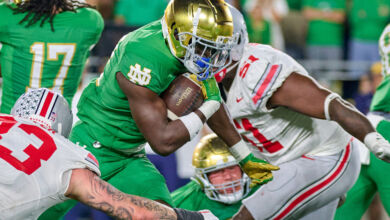
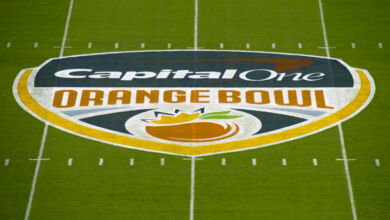
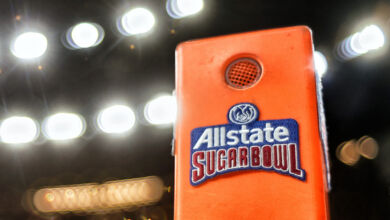
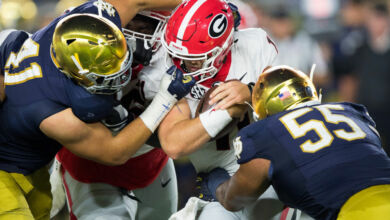
He shoulda caught that ball…you know which one I’m talking about…it was in his hands. It would have stopped that last drive. You shoulda caught that ball.